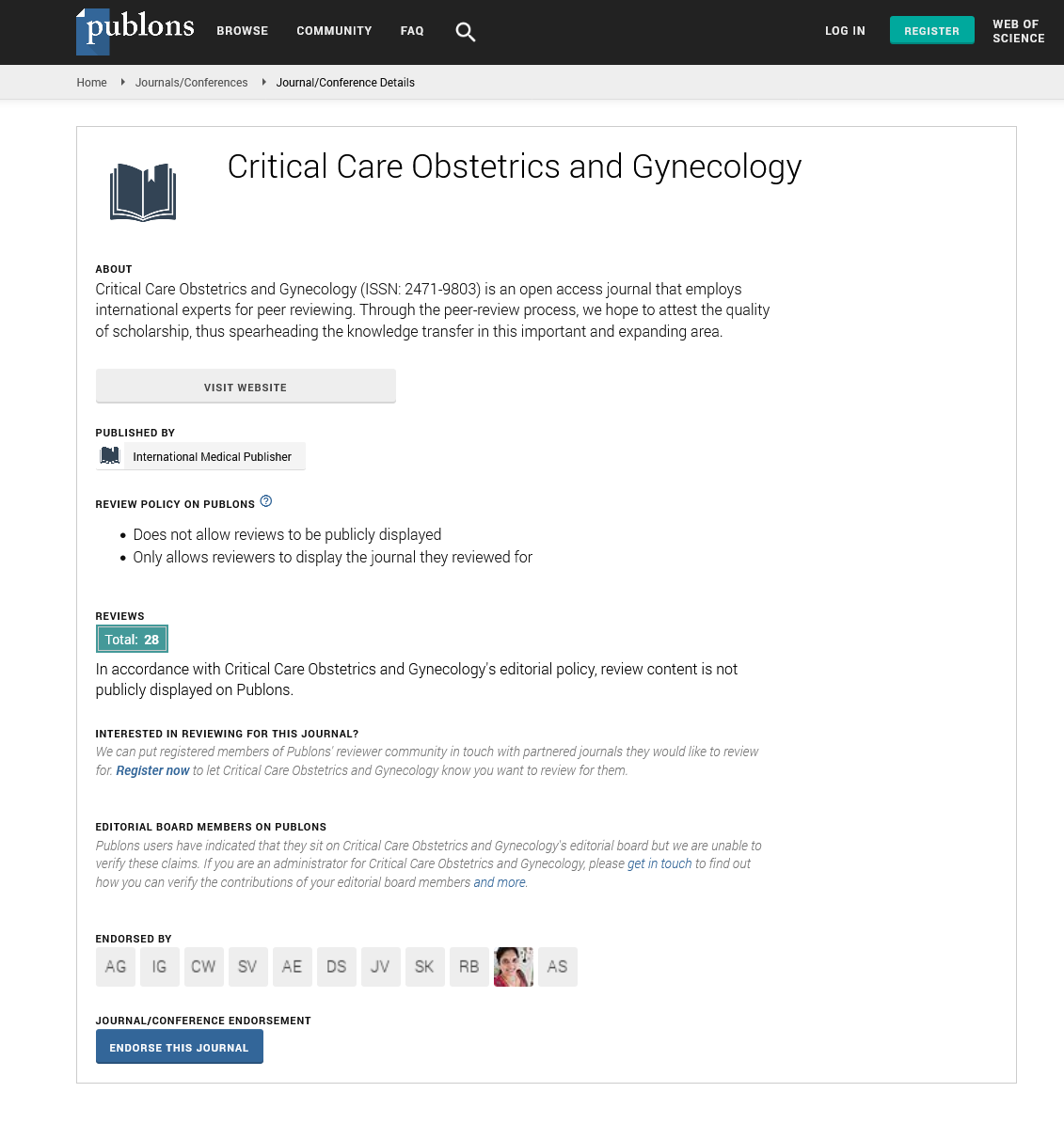ISSN : 2471-9803
Critical Care Obstetrics and Gynecology
Screening for morbid adherent placenta (MAP) in early pregnancy
European Congress on Vaccines & Vaccination and Gynecologic Oncology
October 26 -27, 2018 Budapest , Hungary
Jeni Panaiotova, Mayumi Tokunaka, Karolina Krajewska, Nurit Zosmer and Kypros H Nicolaides
Harris Birthright Research Centre, UK
ScientificTracks Abstracts: Crit Care Obst & Gyne
DOI: 10.21767/2471-9803-C1-002
Abstract
Objective: To estimate the diagnostic accuracy of a two-stage strategy for early prediction of morbid adherent placenta (MAP). In the first stage, at 11-13 weeks’ gestation women with history of previous uterine surgery and low lying placenta are classified as being at high-risk for MAP and in the second stage, at 12-16 weeks, these high-risk pregnancies are assessed at a specialist MAP clinic. Methods: This was a prospective study in women having an ultrasound scan at 11-13 weeks’ gestation as a part of routine pregnancy care. Women with a history of previous uterine surgery and low lying placenta were followed up in a specialist MAP clinic, at 12-16 weeks’ gestation, 20-24 weeks and 28-34 weeks. In each visit to the MAP clinic an ultrasound scan was carried out and the following features suggestive of MAP were recorded: non-visible cesarean section scar, bladder wall interruption, thin retroplacental myometrial thickness, presence of intraplacental lacunar spaces, presence of retroplacental arterial-trophoblastic blood flow and irregular placental vascularization demonstrated by 3D Power Doppler. Results: Screening at 11-13 weeks was carried in 22,604 singleton pregnancies and 1,298 (6%) were considered to be at high-risk of MAP because they had previous uterine surgery and low lying placenta. In the MAP clinic at 12-16 weeks, the diagnosis of MAP was suspected in 14 cases and this was confirmed at delivery in 13. In the rest of the population there were no cases of MAP. Conclusion: Accurate prediction of MAP can be achieved by ultrasound examination at 12-16 weeks gestation.
Biography
Jeni Panaiotova has graduated in medicine and took speciality in Obstetrics and Gynecology in Medical University, Sofia, Bulgaria. During the years, the passion in Fetal medicine, that was rising in her, made her to apply and finish training in Fetal Medicine at Fetal Medicine Foundation, London, United Kingdom. Being part of the FMF team for nearly 4 years and observing how most of the diseases could be predicted as early as first trimester of pregnancy, she and her team decided to start a research of predicting placenta accreta in the first trimester. The aim of their research was to improve the work of obstetricians, dealing with this serious and life threatening obstetric condition, which incidence is rising due to the rising incidence of delivery by Cesarean section worldwide. After four years of hard work, they completed their research and according to the results, they were able to predict placenta accreta. At the present moment, she is working in Nadezhda Women’s Health Hospital, Sofia, Bulgaria, as a Consultant in Fetal medicine and Obstetrics.
E-mail: jeni_panaiotova@yahoo.com
Google Scholar citation report
Citations : 148
Critical Care Obstetrics and Gynecology received 148 citations as per Google Scholar report
Critical Care Obstetrics and Gynecology peer review process verified at publons
Abstracted/Indexed in
- Google Scholar
- China National Knowledge Infrastructure (CNKI)
- WorldCat
- Publons
- Geneva Foundation for Medical Education and Research
- Secret Search Engine Labs
Open Access Journals
- Aquaculture & Veterinary Science
- Chemistry & Chemical Sciences
- Clinical Sciences
- Engineering
- General Science
- Genetics & Molecular Biology
- Health Care & Nursing
- Immunology & Microbiology
- Materials Science
- Mathematics & Physics
- Medical Sciences
- Neurology & Psychiatry
- Oncology & Cancer Science
- Pharmaceutical Sciences
